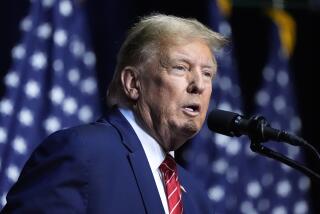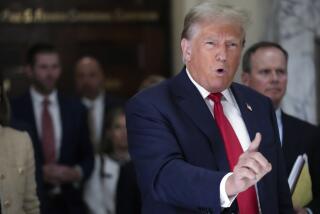Trump seeks credit for 5,000 Sprint jobs already touted
President-elect Donald Trump speaks to reporters at Mar-a-Lago, Wednesday, Dec. 28, 2016, in Palm Beach, Fla.
President-elect Donald Trump sought credit for Sprint’s commitment to create or bring back 5,000 jobs that the carrier says are part of broader U.S. hiring plans previously announced by Japan-based parent SoftBank Group Corp.
Trump said SoftBank Chairman Masayoshi Son was among those behind the move to add workers. The Japanese billionaire, who Trump calls “Masa,” said earlier this month that he intends to invest $50 billion in the U.S. using a previously announced technology fund, creating 50,000 jobs.
“Because of what’s happening and the spirit and the hope I was just called by the head people at Sprint and they’re going to be bringing 5,000 jobs back to the United States,” Trump told reporters Wednesday outside his Florida resort, Mar-a-Lago. “Masa and some other people were very much involved with that.”
The 5,000 jobs in Sprint’s plans are part of Son’s overall 50,000-job commitment, though they’ll be funded by Sprint and not SoftBank, the U.S. carrier said.
The employment will be in customer care, sales and other functions, Sprint said in a statement Wednesday. The company is still determining the location of the positions, which will be filled by the end of March 2018, Overland Park, Kansas-based Sprint said. Sprint had about 30,000 employees as of the end of March, down from 38,000 in 2013, when Son acquired the company.
Trump disputed the notion that the jobs had already been announced, telling reporters later Wednesday that “I just spoke with the head person. He said because of me they’re doing 5,000 jobs in this country.” He referred reporters to his spokeswoman, Hope Hicks, for details. She didn’t respond to a request for comment, and Sprint didn’t respond to follow-up questions.
Son’s vow to invest in the U.S. and create jobs helped provide Trump with evidence he’s producing more work for Americans. It also scored points for Sprint, which was rebuffed by the Obama administration on a previous merger attempt.
Trump also repeated an announcement earlier this month that OneWeb Ltd., a satellite startup backed by Son’s SoftBank Group Corp., will create almost 3,000 jobs in Florida over the next four years. That number consists of about 1,200 jobs at OneWeb, plus about 1,800 jobs at suppliers that work directly with the startup and include Qualcomm Inc., Hughes Network Systems and Honeywell International Inc., Greg Wyler, founder of OneWeb, said in an interview.
“Masa’s meeting with Trump invigorated and inspired Masa to increase investment in OneWeb and accelerate OneWeb’s growth,” Wyler said in an interview. In September, October and November, the U.S. economy gained an average of 176,000 nonfarm jobs a month, according to Bureau of Labor Statistics.
Sprint shares have more than doubled this year on improving subscriber gains and speculation that the company could revisit a long-speculated merger with T-Mobile US Inc., the third-largest wireless provider, under the Trump administration. The stock rose less than 1 percent in early trading Thursday.
Sprint has struggled since 2013, when Son hinted he could try to buy T-Mobile, only to abandon the effort after signals from the Federal Communications Commission and Justice Department that they could oppose the move. While T-Mobile has rebounded, becoming the country’s fastest growing carrier, Sprint has cut costs and mortgaged assets to contain its debt.
OneWeb is developing small, low-orbit satellites to provide wireless internet access in remote areas. The company raised $1.2 billion from SoftBank and others this month. The Trump administration’s interest in space accelerated OneWeb’s plans, said a spokesman, Charles Palmer.
Consumer and business confidence has surged since the election, reflecting optimism about Trump’s pledges to boost growth, keep the labor market churning, cut taxes and ease regulations. Trump has meanwhile scored political victories as president-elect by appearing to persuade individual companies to keep or create jobs in the U.S., and by intervening in Pentagon contracts.
Trump struck a deal with United Technologies Corp.’s Carrier unit last month to keep about 800 manufacturing jobs at a furnace factory in Indianapolis. Trump had vowed during his campaign that he would force the company to abandon plans to move the jobs to Mexico. About 1,000 Carrier jobs are still leaving the state for Mexico, and the company will receive about $7 million in incentives from state taxpayers for the positions it is keeping in Indianapolis.
This month, IBM Chief Executive Officer Ginni Rometty -- a Trump economic adviser -- announced just before a meeting with Trump that she planned to hire 25,000 people in the U.S. and invest $1 billion over the next four years.
Earlier this month, Trump called on Boeing to cut the price of a new version of the president’s aircraft, Air Force One. Last week, he said he had asked the company to “price-out” a new version of its F-18 Super Hornet fighter that could compete with Lockheed Martin Corp.’s F-35 Joint Strike Fighter, the most expensive U.S. weapons system ever.
The announcements have buttressed Trump’s campaign-trail claims that he would use his business acumen to broker better deals for American workers and taxpayers. He’s also said he will exit or renegotiate trade deals that make it easier for companies to shift production to countries with lower labor costs, and threatened to impose significant tariffs on imports.
Trump’s public pronouncements sometimes exaggerate either the costs of projects he’s trying to influence or his own impact. For example, he said the new Air Force One would cost $4 billion, while the Air Force has budgeted $3.2 billion so far to research, develop and purchase two of the planes. He claimed he had convinced Carrier to keep more than 1,000 jobs in Indianapolis; the accurate number is about 800. In November, the president-elect claimed credit for convincing Ford to keep an auto plant in Kentucky rather than moving it to Mexico. Ford had planned to move production of a specific model to Mexico, but did not expect to close the Kentucky plant or reduce the number of jobs there.
And while companies have expressed optimism over Trump’s promise to lower the corporate tax rate, new tariffs could ratchet up the price of consumer goods.
Bloomberg’s Jennifer Epstein contributed.
More to Read
Start your day right
Sign up for Essential California for news, features and recommendations from the L.A. Times and beyond in your inbox six days a week.
You may occasionally receive promotional content from the Los Angeles Times.





